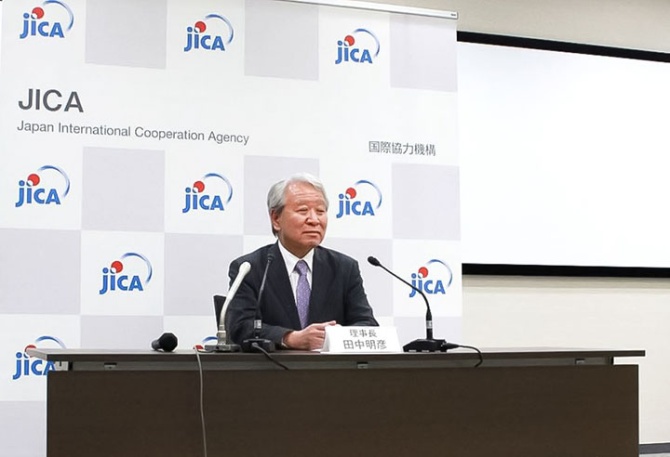In a press conference held to announce his new position as president of the Japan International Cooperation Agency (JICA), Dr. TANAKA Akihiko declared his determination to “go out into the field at every possible opportunity to promote Japan’s development cooperation.”
“It is necessary to demonstrate the presence of Japanese society to the world while maintaining close relations with the local people,” said Dr. Tanaka, who took office on April 1. He was speaking at his inaugural press conference, where he discussed the challenges JICA will be tackling during his tenure.
Of JICA's Medium-term Objectives and Medium-term Plan (Note 1) for the next five years, Dr. Tanaka said, “It is my task to ensure steady and effective implementation.” He said that the challenges and priorities outlined in the plan are based on the principles of quality growth and human security, as set forth in the Development Cooperation Charter formulated in 2015. He noted that the concept of human security, in particular, is reflected in the Sustainable Development Goals’ (SDGs) policy of “human-centered development” and “leaving no one behind.” He also said that JICA has collated its experience and strengths in the form of the JICA Global Agenda, through which it contributes to the SDGs.
Dr. Tanaka also pointed out that although there are many unstable political situations and development challenges in the international community—especially in the vigorous growth region of the Indo-Pacific—it is important from the perspective of supporting Japan's dynamism to make the region free and open, leading to the vision of a “Free and Open Indo-Pacific (FOIP).”
At the same time, he acknowledged Japan's long-term economic stagnation and the need to increase its impact through intellectual influence and personal relationships. He also expressed his commitment to sharing Japan's development experience, which has been achieved through a series of successes and failures over the course of its transition to modernity, as well as a commitment to joint research (Note 2) on global issues such as environmental protection and disaster prevention. To do this, universities and research institutions in Japan and the developing regions should work together to develop and apply new scientific discoveries and new technologies.
As Japan’s birthrate declines and society ages, it is important to work together with a diverse range of people, including foreign nationals, for the future development of Japanese society. Dr. Tanaka emphasized how JICA’s more than 110 offices in developing regions and other parts of the world cooperate with Japanese companies and local individuals and organizations. With its experienced network of Japan Overseas Cooperation Volunteers (JOCV), JICA has the potential to play a major role in co-creating a more diverse society, and contributing to the revitalization of Japan.
In a time of global crises, cooperating with vulnerable populations is a challenging issue.
The world is currently facing a number of crises, compounded by the continued spread of coronavirus infections and Russia's invasion of Ukraine. Dr. Tanaka said that cooperation is urgently needed to set the most vulnerable people in developing regions, who are suffering the most in these difficult times, on the path toward sustainable development.
The number of Japan’s international exchanges has decreased sharply during the coronavirus pandemic, and is just now beginning to be revitalized. Dr. Tanaka emphasized that JICA's most recent mission is to reassure nations, particularly developing ones, that Japan is once again active in the development arena. He said that JICA is now planning to dispatch JICA experts and volunteers at pre-pandemic levels.
This is the second time that Dr. Tanaka has served as president of JICA. During his previous term, he made 91 trips to 57 countries over the three-and-a-half-year period from April 2012 to September 2015. He also held 82 meetings with leaders at the head-of-state level both in Japan and abroad. Now, looking to the future, he said, “I would like to continue to actively deepen my relationship with global leaders and realize JICA's vision of 'Leading the world with trust.'" He expressed his desire to “go out into the field at every possible opportunity to promote Japan's development cooperation, and communicate [JICA’s] vision to the domestic and international audience.”
*1
*2





scroll